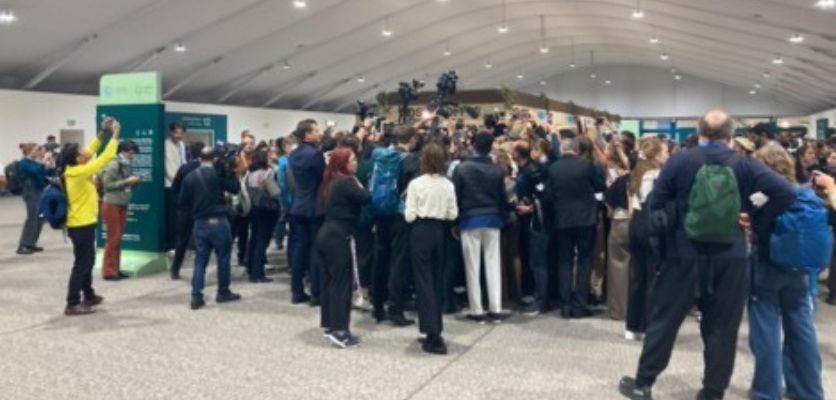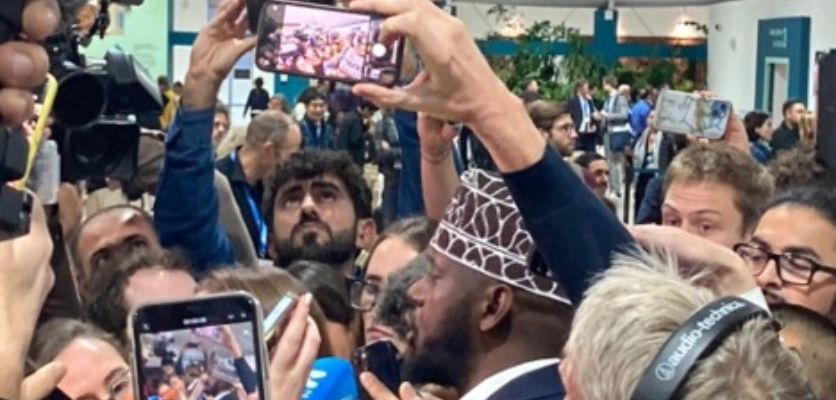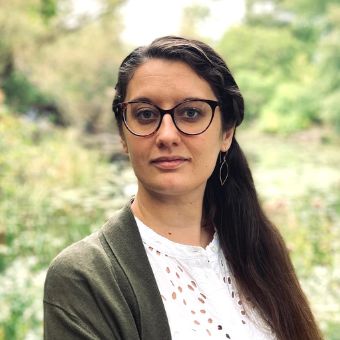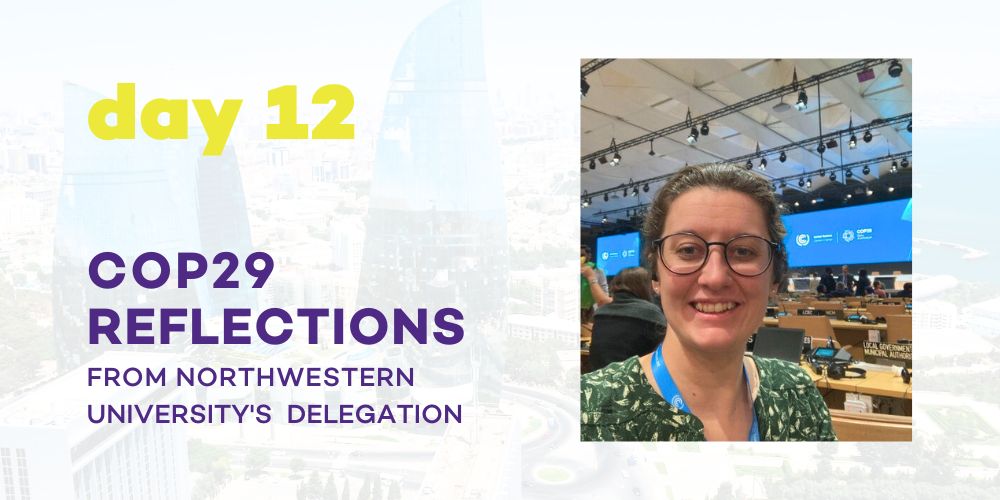Reflections from Northwestern University's COP29 Delegation: Day 12
For a fourth year, a delegation of Northwestern University students and faculty supported by the Buffett Institute is among more than 30,000 researchers, policymakers, industry leaders and activists at the world’s largest annual international treaty negotiations and climate summit, the 29th Conference of Parties (COP29) to the United Nations Framework Convention on Climate Change (UNFCCC), this year hosted in Baku, Azerbaijan. Each day, a different Northwestern delegate is blogging about their experiences and reflections. Day 12 features Diana K. Elhard, a PhD candidate in the Department of Political Science.
As I sit in the main plenary room in Baku Stadium, COP29 is running roughly 27 hours overtime. I see Party delegates mingling on the floor, an NGO representative wrapped in a keffiyeh napping in her chair, press people working on drafts, people milling about with bluetooth headphones debating anticipated outcomes, and a huddle of negotiators from the Group of 77 and China, and some people exchanging hugs as they depart for the airport. We are waiting for COP29 to close. Earlier this evening, the closing plenary session began and final agreements were gavelled in, adopted by Parties, on Article 6 of the Paris Agreement.
I have had the incredible opportunity to attend 4 UNFCCC COPs in-person before this one in Baku. I have also never seen a closing plenary, as COPs nearly always run over and flights and hotels booked months in advance. When I tell people that I want to see a closing they nearly always say something along the lines of “Why? They’re so boring.”
But they are also unique moments in time. Most of the thousands of people who walked through these halls have gone home. The offices, pavilions, and meeting rooms are standing open, furniture being dismantled, electronics stowed in boxes for removal. The people who remain have a purposeful presence. I am learning that the closing is a threshold of sorts, a blip in the bizarre universe of COPs, which are themselves temporary in nature, where there is simultaneous worry, hope, frustration, anticipation, farewells, promises to meet again and continue fighting. I imagine that even at COPs where there are smaller agendas or everything is ‘agreed’ there is still a worry or possibility of a Party objecting.
Press huddle surrounding representatives of the groups who walked out of negotiations, Blue Zone, Baku.
At COP29 particularly, there is a sense of transition and anticipation as we wait for the closing. Only hours ago people on the ground, myself included, questioned if there would be an outcome here on the most anticipated agenda item—the New Collective Quantified Goal on climate finance. Around 16:45 this afternoon, Baku time, the Least Developed Countries (LDCs) and Alliance of Small Island States (AOSIS) walked out of ongoing ministerial negotiations. The primary concerns were frustration with the process under the COP29 Presidency and draftNew Collective Quantified Goal (NCQG) text that they said did not go far enough for their member states.

Mohamed Adow, Power Shift Africa, speaking to press after the negotiation walkouts.
As I type this from the floor of the plenary room it seems there has been a tone shift—we are hearing rumors of a different NCQG decision text after the walkout. People who were teary eyed in frustration or exhaustion hours ago are now laughing together and chatting on the floor of the plenary.
The room has a chilling draft when not at capacity and the venue ran out of food hours ago. It is also nearly midnight. Is it boring? Not at all—there is so much to watch and follow. Is it uncomfortable? Yes. Is everyone exhausted? Yes.
But this moment is unique. Regardless of the outcome it will set the tone for years of UNFCCC negotiations: we will have a new goal on climate finance or not. In less than 12 hours I will be on a plane home, but I am hoping to have witnessed a COP closing plenary - hopefully with a historic new international climate finance goal that accommodates the concerns expressed by LDCs and Small Island Developing States (SIDS).

Diana K. Elhard is a PhD candidate in the Department of Political Science at Northwestern University. Her dissertation project focuses on UNFCCC climate finance negotiations. She follows UNFCCC meetings as well as the Standing Committee on Finance, Global Environment Facility, Green Climate Fund and the ad-hoc work program on the New Collective Quantified Goal on climate finance (NCQG), among others. Diana has studied the UNFCCC since COP21 in 2015, where the Paris Agreement was agreed. Utilizing qualitative methods, she follows these processes and key actors including variation in their roles and their use of different political discourses.

